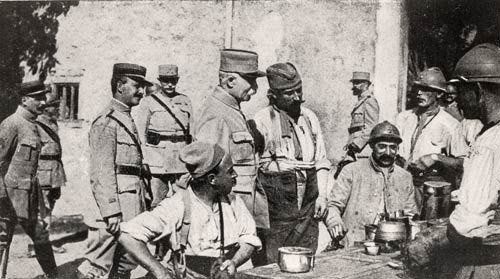The Big Push
The War in Ukraine (2014-2023)
The position warfare so closely tied to our understanding of the First World War served a multitude of purposes. In the autumn of 1914, for example, some French and German armies dug trenches in order to free other friendly formations for mobile operations. The Germans did the same in 1915 and 1917, when they defended in the west so that they might attack in the east. After the mutinies of the spring of 1917, the French forces held their positions so that factories might build tanks, America might raise an army, German civilians might feel the effects of the naval blockade, and German soldiers might die.1
The pundits who predict an imminent Russian offensive in Ukraine presume that the adoption of position warfare by Mr. Putin’s legions serves the first of these purposes. This may, indeed, be the case. (As before, I forbear prognostication.) It is quite possible, however, that the essentially defensive posture of Russian ground forces in Ukraine serves other purposes as well. One of these is attrition, both human and financial. The other is the purchase of time for the unrolling of efforts in other realms, particularly those of economics and diplomacy.
In the absence of reliable numbers, the progress of attrition, both within the Ukrainian forces and among the financial backers of that country, is hard to gauge. Thus, if long accumulation of losses leads to a catastrophic collapse, it may, like the implosion of the German Empire in 1918, take most interested parties by surprise. The fruits of the Russian diplomatic offensive, as well as associated initiatives in the bailiwick of the grim science, are easier to evaluate.
So far, the Russian campaign to “win friends and influence people” has enjoyed enormous success. Russia and China are closer now than they have at any time since the Korean War. Russia and India have renewed their old romance. Russia has even managed to convince Saudi Arabia, not merely to make peace with Iran, but to participate in efforts to displace the US dollar as the planet’s premier reserve currency.
While not as impressive as the charm offensive of Mr. Lavrov, the performance of the Russian economy has been solid. Thus, while Western purveyors of luxury goods have left Russian shopping malls, rank-and-file Russians are heating their homes and feeding their families as well as they did before the current phase of the war. To put things another way, I suspect that many consumers in Germany, France, or the United Kingdom would gladly give up Starbucks and McDonalds for a return to 2020 prices for groceries and gas.
How long Mr. Putin’s winning streak will last is anyone’s guess. For the time being, however, the combination of position warfare in Ukraine with initiatives in other spheres is working well for the Russians. Thus, they would be foolish to exchange it for an offensive that, however advantageous the odds might be, necessarily involves a roll of the dice.
For details of French efforts to “wear down” German military manpower, see Louis Adolphe Paquet, La Défaite militaire de l’Allemagne en 1918: L’usure des effectifs allemands, La Stratégie allemande et la manoeuvre des Alliés [The Military Defeat of Germany in 1918: The Attrition of German Effectives, German Strategy, and the Maneuver of the Allies] (Nancy: Berger-Levrault, 1926.)



